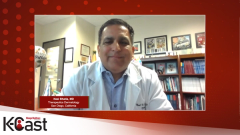
Navigating the AD Treatment Landscape
Dr Neal Bhatia explains the available treatment options for patients with AD, including their relation to guideline recommendations.
Neal Bhatia, MD: In dermatology, allergy, and across the board, we look at guidelines as a template and, in many cases, an update of different treatment options. The landscape has changed over the past several years—even decades—from topical therapies alone and immunosuppressives. We’ve gained many targeted therapies over the past several years. We were part of the clinical research trials for dupilumab and many of the Janus kinase inhibitors. Over time, we’ve seen these become part of the mainstream in dermatology in terms of how we’re treating the approach to not only make things go away but keep things away.
Patients still like to treat from the top down. We use steroids to put out fires. We use prednisone tapers as we need to. Topical anti-itch lotions as well as antihistamines are important. We have the cleansing and moisturizing instructions that we provide all the patients through the [American] Academy of Dermatology and our other outlets. If topical therapies aren’t working, we turn to oral and injectable therapies as the next steps, including calcineurin inhibitors and crisaborole, a phosphodiesterase-4 inhibitor. These work well to try to slow down a flare or even intercept it as it’s growing. The JAK inhibitors have given us a lot of opportunities to put things out fast. The biologics have given us opportunity to have staggered dosing of therapies that will work well for the long run with very few safety issues.
It’s going to be a management strategy where you work with the patients and say, “Who’s a topical patient? Who’s an oral patient? Who’s an injectable patient? Are we doing things from the top down as well as inside out?” All those approaches are essential to managing the disease. But if we’re not controlling the itch, we’re not doing our jobs completely.
The past couple of years, the treatment landscape has evolved from just topical therapies and systemic immunosuppressants, which aren’t specific for the disease or even indicated by FDA guidelines or clinical trial work. Drugs like methotrexate are psoriasis drugs and rheumatologic drugs. Cyclosporine is a transplant drug. CellCept [mycophenolate mofetil] is an immunosuppressive drug. But these tend to get used quite a bit for atopic dermatitis, but they don’t affect the same cell lines and even suppress immune responses, which can compromise patient safety.
Now that we have targeted treatment options that go after the cytokines that are involved or the development of cytokine inflammation and inhibiting it with Janus kinase inhibitors, we have many more targeted ways to interrupt the process and stop it in its tracks. I like to use the example of turning off the faucet vs mopping up the mess, because steroids, calcineurin inhibitors, and other immunosuppressives basically go after the amount of inflammation that’s developed, while targeted therapies try to stop it in its tracks from progressing.
This transcript has been edited for clarity.
Newsletter
Get the latest industry news, event updates, and more from Managed healthcare Executive.


























